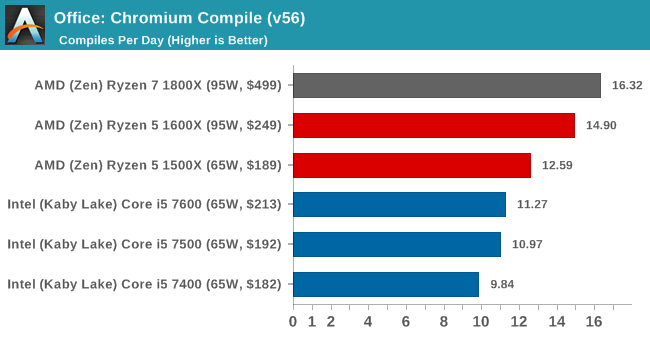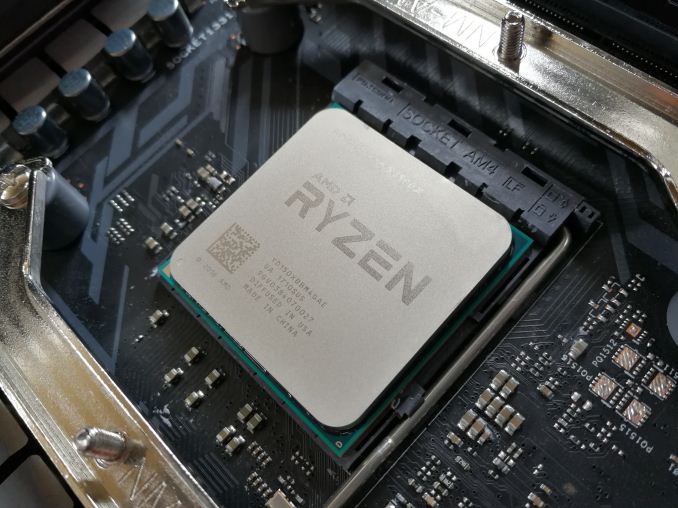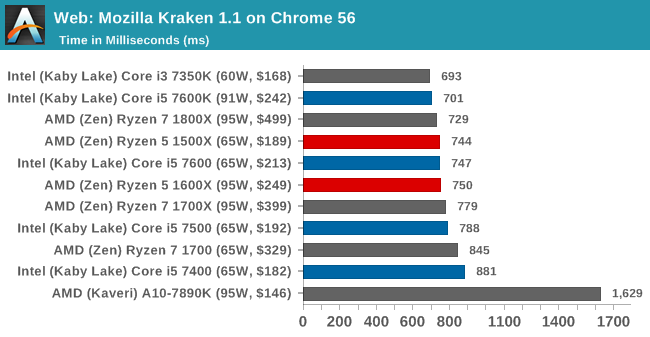The AMD Ryzen 5 1600X vs Core i5 Review: Twelve Threads vs Four at $250
by Ian Cutress on April 11, 2017 9:00 AM ESTAMD Ryzen 5
We mentioned at the top of the review that AMD’s Ryzen 7 launch last month benefited in a market where the competition was extremely expensive – being able to offer equivalent performance in most tasks and then undercut the competition by 50% is a difficult task, but the opening was always there due to a lack of competition in this space. When it comes to the mainstream market, the Ryzen 5 processors are actually competing on price with Intel’s processors directly, and thus has to offer something more to compete.
We have already shown in previous reviews that the Zen microarchitecture from AMD is around the equivalent of Intel’s Broadwell microarchitecture, but at this lower price point we have AMD’s Zen against Intel’s Kaby Lake, which is two generations newer than Broadwell and affords a comfortable IPC uplift over Broadwell. Given AMD’s monolithic design strategy of a single silicon die catering for most of their product line (well, all of it so far), the way AMD is tackling this is through more cores.
Before the debate about cores from AMD’s past rears its head (Vishera/Bulldozer designs in that case), given that AMD’s single thread performance is not too far behind, having a big set of cores as an alternative is something interesting for end-users, especially as more work flows and gaming titles rely on multithreading to scale. As a result, where Intel offer four cores and four threads, AMD is now offering six cores and twelve threads – a potential +200% uptick in the number of threads and +50% in cores, albeit at 10-15% lower instructions per clock.
(There’s also a side argument here about die sizes and wafer costs to each company to consider, but we will leave that for a different piece.)
For this review, based on time and available parts, we tested the Ryzen 5 1600X six-core processor against a set of Intel Core i5 parts that users might also be considering. We have some Ryzen 5 1500X quad-core numbers in here as well, and that might be spun out into a separate review at a later date. We also demonstrated our new 2017 CPU gaming tests, with four GPUs, six tests, two resolutions per test, and a couple of extra extreme resolution tests.
On The Benchmark Results
Looking at the results, it’s hard to notice the effect that 12 threads has on multithreaded CPU tests. The usual culprits show big wins for AMD here: 2D to 3D photo conversion, ray tracing, Blender, Cinebench, Encryption and video transcoding are all sizable wins. This is the sort of workload in which moving up to the Ryzen 7 CPUs, budget permitting, also do well on.
A new test in our suite for this review is a Compile Chromium test on Windows. As part of our testing suite, we have a fixed nightly download from mid-March and set this to compile, taking the final time and converting it into how many compiles per day. For around $250, Ryzen is the only way to go:

As you would expect, AMD still lags in IPC to Intel, so a 4.0 GHz AMD chip can somewhat compete in single threaded tests when the Intel CPU is around 3.5-3.6 GHz, and the single thread web tests/Cinebench results show that.
On The Gaming
Our gaming tests are a mix of Full-HD and 4K testing, some of which ends up being more CPU limited than we expected.
Civilization, at both 1080p and 4K Ultra settings, seem to scale quite happily with more cores on all GPUs, except the GTX 1060 at 4K. It’s worth noting situations such as the R9 Fury at 1080p Ultra only has 920ms under 60 FPS on the 1600X, compared to 6300 milliseconds on the Core i5-7600.
Shadow of Mordor leans towards the higher IPC of Intel, as the DX11 title cannot take advantage of the cores as much. Rise of the Tomb Raider’s benchmark is notorious for having each of its three seconds perform differently with respect to CPU scaling, with the Prophets scene being more CPU limited than the rest of the stage in the game.
Rocket League using an AMD CPU + AMD GPU actually provides more equal results with NVIDIA GPUs, however there's a performance drop using Ryzen + NVIDIA, which potentially correlates towards a driver bug but we're not 100% sure what is going on. Grand Theft Auto is a mixed bag, despite being a DX11 title – in some situations the Ryzen 5 is ahead of the Intel CPUs, or they all perform about the same, or the Intel CPUs pull ahead.
I have $250, What Should I Get – the Core i5 7600/7600K or the Ryzen 5 1600X?
Platform wise, the Intel side can offer more features on Z270 over AM4, however AMD would point to the lower platform cost of B350 that could be invested elsewhere in a system.
On performance, for anyone wanting to do intense CPU work, the Ryzen gets a nod here. Twelve threads are hard to miss at this price point. For more punchy work, you need a high frequency i5 to take advantage of the IPC differences that Intel has.
For gaming, our DX12 titles show a plus for AMD in any CPU limited scenario, such as Civilization or Rise of the Tomb Raider in certain scenes. For e-Sports, and most games based on DX9 or DX11, the Intel CPU is still a win here.












254 Comments
View All Comments
Phiro69 - Tuesday, April 11, 2017 - link
Thank you Ian!Maybe at some point as part of your benchmark description you have a url to a page showing basic (e.g. exactly the level of information you provided above but not step by step hand holding) benchmark setup instructions. I know I wonder if I've configured my builds correctly when I put together new systems; I buy the parts based on benchmarks but I don't ever really validate they perform at that level/I have things set correctly.
qupada - Tuesday, April 11, 2017 - link
I was curious about this too. Obviously a direct comparison between your Windows test and my Linux one is going to be largely meaningless but I felt the need to try anyway. Since Linux is all I have, this is what we get.My Haswell-EP Xeon E5-1660v3 - approximately an i7-5960X with ECC RAM, and that CPU seems to be oft-compared to the 1800X you have put in your results - clocks in at 78:36 to compile Chromium (59.0.3063.4), or 18.31 compiles per day (hoorah for the pile of extra money I spent on it resulting in such a small performance margin). However that's for the entire process, from unpacking the tarball, compiling, then tarring and compressing the compiled result. My machine is running Gentoo, it was 'time emerge -OB chromium' (I didn't feel like doing it manually to get just the compile). Am I reading right you've used the result of timing the 'ninja' compile step only?
I only ask because there definitely could be other factors in play for this one - for the uninitiated reading this comment, Chromium is a fairly massive piece of software, the source tar.xz file for the version I tried is 496MB (decompressing to 2757MB), containing around 28,000 directories and a shade under 210,000 files. At that scale, filesystem cache is definitely going to come into play, I would probably expect a slightly different result for a freshly rebooted machine versus one where the compile was timed immediately after unpacking the source code and it was still in RAM (obviously less of a difference on an SSD, but probably still not none).
It is an interesting test metric though, and again I haven't done this on WIndows, but there is a chunk in the middle of the process that seems to be single-threaded on a Linux compile (probably around 10% of the total wall clock time), so it is actually quite nice that it will benefit from both multi-core and single-core performance and boost clocks.
Also with a heavily multi-threaded process of that sort of duration, probably a great test of how long you get before thermal throttling starts to hurt you. I have to admit I'm cheating a bit by watercooling mine (not overclocked though) so it'll happily run 3.3GHz on a base clock of 3.0 across all eight cores for hours on end at around ~45°C/115°F.
rarson - Tuesday, April 11, 2017 - link
14393.969 was released March 20th, any reason you didn't use that build?Ian Cutress - Friday, April 14, 2017 - link
Because my OS is already locked down for the next 12-18 months of testing.Konobi - Tuesday, April 11, 2017 - link
I don't know what's up with those FPS number in rocket league 1080p. I have ye olde FX-8350 @ 4.8GHz and a GTX 1070 @ 2.1GHz and I get 244fps max and 230FPS average at 1080p Ultra.Ian Cutress - Tuesday, April 11, 2017 - link
I'm running a 4x4 bot match on Aquadome. Automated inputs to mimic gameplay and camera switching / tricks, FRAPS over 4 minutes of a match.jfmonty2 - Wednesday, April 12, 2017 - link
Why Aquadome specifically? It's been criticized for performance issues compared to most of the other maps in the game, although the most recent update has improved that.Ian Cutress - Friday, April 14, 2017 - link
On the basis that it's the most strenuous map to test on. Lowest common denominator and all that.Adam Saint - Tuesday, April 11, 2017 - link
"Looking at the results, it’s hard to notice the effect that 12 threads has on multithreaded CPU tests"Perhaps you mean *not* hard to notice? :)
coder543 - Tuesday, April 11, 2017 - link
I agree. That was also confusing.